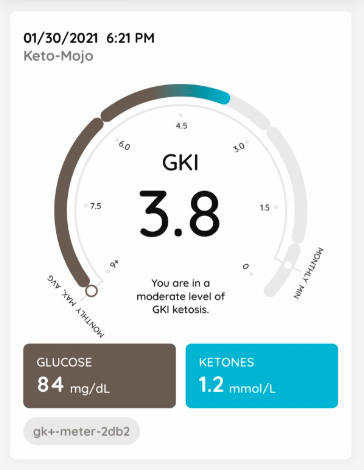It was glorious.

And I didn’t even share a bite.

Lisa had a thin-crust Herb Chicken Mediterranean, and she didn’t share either.
I don’t think that’s what they mean by The Mediterranean Diet.
We had started our #3DayCancerPreventionFast last Sunday afternoon, and since noon Tuesday had been in at least a moderate level of GKI ketosis (<6).
My ketones had been above 1.0 mmol/L since later that afternoon, and for most of the time since then I was in the high (<3) or highest (<1) GKI level for four straight days.
Mission accomplished.
Chapter 16 of The Case for Keto, an outstanding book by Gary Taubes which I highly recommend, is called “Lessons to Eat By.” One of these six lessons is from Katherine Kasha, a family medicine doctor from Edmonton, Canada.
If you do fall off the wagon, at least you know there’s a wagon to get back on.
Dr. Katherine Kasha
When Lisa and I first heard this in the audio book it really resonated with our experience.
The problem we had four years ago was we didn’t really know what would work for us to reliably lose weight.
Now we know what works – where the wagon is heading – and can easily get back on. And we step on the scale each morning to track out direction.
We do take issue to some extent, however, with the admonition from some that when you get on the low-carb path you need to come to grips with never eating some of those favorite carb-laden foods again.
But then they talk about “falling off the wagon,” and not letting it get you defeated, and that instead you need to “just get back on.”
I don’t think that’s the best way to think about it, and as I discussed it with Lisa, I developed what I think is a much better formulation:
You decide when you want to step off the wagon.
And then you step back on.
That makes it much less likely you will fall off it.
If I think I can never have pizza again, I’m much more likely to be tempted to indulge.
Or to sneak a few fries from the grandchildren at the fast food drive-through window.
But if I plan when I will be having it (or my favorite ice cream dessert), I don’t feel perpetually deprived.
You have to know yourself. You may have a carbohydrate addiction, and for you it might, at this point, be like someone with alcoholism taking a drink.
You may want to wait until you’ve reached your weight loss or health goals, when you feel confident enough that you won’t relapse.

And maybe at that point you’ll be so happy and well-adapted to low carb that you’re not even interested in pizza, pasta and cookies.
I really enjoy ketogenic eating, and combined with the daily weigh-ins I don’t have concerns that stepping off the wagon today will get me seriously off course.
These were my glucose and ketone readings before I stepped off at about 7 p.m. tonight.
So it’s bye-bye ketosis tonight, and I’ll update this post later with both my lowest ketone and highest GKI readings, and then with how long it takes me to get back into GKI ketosis.
What’s your experience? Does a planned excursion help you stay on the wagon most of the time? Or has it led to a significant setback?
Check out My Health Journey for the full story of our health improvements, and my #BodyBabySteps for an approach to how I would do it if I were starting today, based on what I’ve learned.
I post updates frequently you can follow on Facebook, Twitter and LinkedIn, or you can subscribe by email to make sure you get them.
Update (2/1/2021):
Well, I thought it was going to be bye-bye to ketosis.

First, I will confess that the gluten-free beer pictured above was not my only one Saturday evening.
I was pleasantly surprised – astonished even – that the next morning I was still in GKI ketosis, and that with my regular LCHF eating on Sunday I stayed there, although I was technically borderline last night.
And at right you see my readings just before work this morning.
Seems that’s a topic for another post.